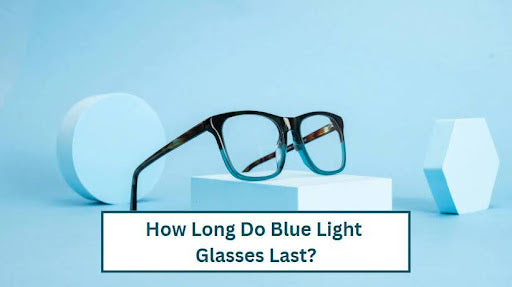
How Long Do Blue Light Glasses Last? When to Replace Them?
Televisions, smartphones, and laptops dominate our work and social lives. These screens emit blue light, and long exposure to this high-intensity light can be harmful to your eyes.
Now, you can protect your eyes simply by wearing a good pair of blue light glasses. But how long can these glasses keep protecting your eyes? Is there an expiry date for blue light glasses? What are the signs that you should replace them?
This guide addresses those questions. You’ll also get practical tips on extending their working life, maximizing your investment, and protecting your vision.
Let’s dive right in.
The Science Behind Blue Light Glasses
Blue light glasses have a filter or coating that prevents low-wavelength blue light from reaching your eyes.
Blue light is good during the day, performing a key function of keeping us alert and awake. But, evening or night exposure to this light can cause eye strain and sleep issues.
Blue light can be one of the main reasons for eye strain as it falls in the high-energy spectrum of the white light.
Plus, it interferes with the normal production of the sleep hormone melatonin; abnormal exposure in the form of excessive use of digital devices can disturb your sleep cycle.
Now, there are two ways of making these glasses block the blue light:
Lens Coating: A thin layer on the lens surface absorbs or reflects the blue light. These coatings can wear over time.
Embedded Filtering: Blue light blocking material, such as polymers, is embedded into the lens during manufacturing.
These glasses typically remain fine as long as the lenses are working.
How Long Do Blue Light Glasses Last?
Like anything else, blue light glasses have an expiry. In other words, there’s a limited lifespan of these glasses, which typically ranges from 1 - 2 years.
However, a high-quality pair with effective care can last several years. Their lifespan also depends on the lens type.
Coated Lenses: Blue light coatings are like anti-reflective coatings. They typically last anywhere between 28 to 30 months. Without proper care, the coating may start to peel or degrade after the two-year mark.
Embedded Filtering: In this variant, the blue light blocking material is embedded into the lenses. These glasses keep their filtering capability as long as the lenses aren’t physically damaged.
Factors Influencing Longevity
Let’s discuss some important factors that influence the longevity of blue light glasses.
Quality of Materials
Not all blue light glasses are created equal. Some have high-quality lenses, which makes them expensive.
More affordable pairs tend to last for shorter periods, but can work fine if you’re going to use them occasionally.
High-quality materials, whether it’s the lenses or the frames, resist wear better than budget alternatives.
Frequency and Intensity of Use
The rule of thumb is, “The more you use your blue light glasses, the sooner you might have to replace them”. So, if your screen time is 8 - 10 hours daily, they may not last that long.
Extensive use can accelerate coating wear and frame stress.
Care and Maintenance

If you want to extend the lifespan of your glasses, keep them clean. Don’t use abrasive cloths or harsh chemicals for cleaning.
Proper storage is also crucial. Keep your blue light glasses in a protective case to prevent scratches and frame distortion.
Environmental Exposure
No matter how durable the frame and lens material, it can degrade quickly when exposed to a harsh environment.
Keep your glasses away from extreme temperatures, UV light, and humidity. Extra care goes a long way. For instance, don’t place your glasses in a hot car; it’ll degrade the coating faster.
Signs It's Time to Replace Your Blue Light Glasses
When your glasses are broken and are irreparable, it's time to get new ones. But that's an obvious one.
Here are some relatively non-obvious reasons to replace a pair of blue light glasses:
Deep Scratches
Light scratches are usually harmless, but deep scratches can affect vision and reduce blue light filtering.
Bent Frames
A minor bend in the frame is usually fixable. But if the frames don't fit your face or aren't aligned, they may not filter enough blue light.
Increased Eye Strain
This is more relevant to coated lenses. If you're experiencing consistent eye strain and dryness despite wearing blue light glasses, the lenses may not be effective anymore.
Prescription Changes
If you got your blue light glasses on prescription, a change in your vision will require a new pair to maintain clarity in vision.
How to Care for Your Blue Light Glasses
Like we said before, these glasses don't have a fixed lifespan. On average, expect them to last around 2 years.
Let's do a quick recap on how to extend their working life with simple techniques.
Store Them Properly
Use a hard-shell case to shield your glasses from dust and damage. Don't leave them in a hot and humid environment.
Cleaning Techniques
Use lukewarm water and dish soap to clean the smudges off the lenses. To avoid scratches, dry the lenses with a microfiber cloth.
Regular Maintenance
Keep an eye for minor scratches and and loose screws. Fix small issues before they do further damage.
Frequently Asked Questions
Let’s address some frequently asked questions about how long blue light glasses last.
How Often Do Blue Light Glasses Need to Be Replaced?
Replace your blue light glasses if they’re scratched, bent, or become less effective. Careful usage may extend their life, but coatings may fade after some time.
Do Blue Light Glasses Wear Out Over Time?
Yes, blue light glasses wear out over time, especially coated lenses. Their average life is around 2 years, but you can extend that with proper care.
Is It OK to Wear Cheap Blue Light Glasses?
Cheap glasses are more likely to wear out quickly, and they’re not as effective in filtering blue light as well. So, get a high-quality pair from a reputable brand.
Do Blue Light Glasses Degrade?
Yes, blue light glasses degrade in about two years, especially coated lenses. Embedded ones tend to have a longer life unless you scratch or damage the lenses.
Conclusion
The exact lifespan of any pair of blue light glasses depends on factors such as the type of lens, build quality, and how you use them.
Glasses from reputable brands can last as long as 2 years, and even more if you have a proper maintenance routine.
If you want to extend their life, keep them in a secure case and avoid leaving them in an extreme or humid atmosphere.
Look out for signs like scratches, bent frames, and strained eyes to decide if you need a new pair of blue light glasses.
